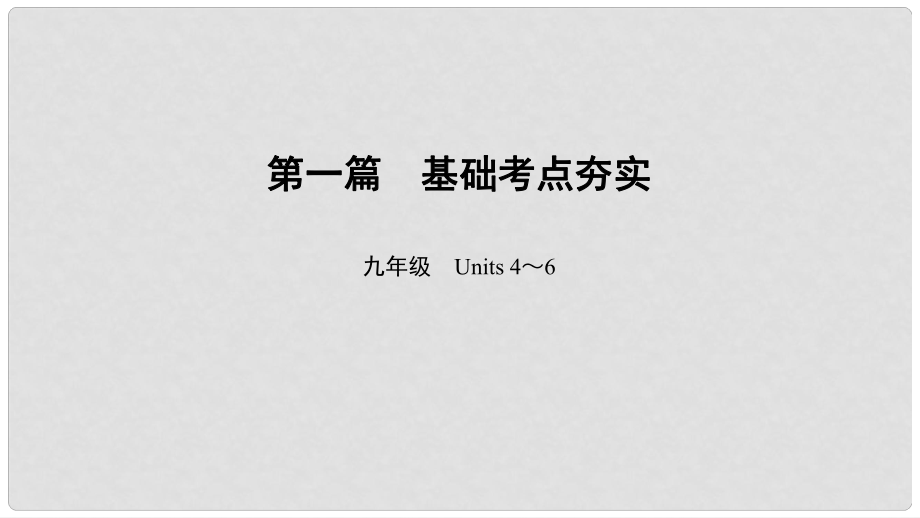《中考英語(yǔ)總復(fù)習(xí) 第1篇 基礎(chǔ)考點(diǎn)夯實(shí) 九年級(jí) Units 46課件 人教新目標(biāo)版》由會(huì)員分享,可在線閱讀�����,更多相關(guān)《中考英語(yǔ)總復(fù)習(xí) 第1篇 基礎(chǔ)考點(diǎn)夯實(shí) 九年級(jí) Units 46課件 人教新目標(biāo)版(25頁(yè)珍藏版)》請(qǐng)?jiān)谘b配圖網(wǎng)上搜索����。
1、第一篇第一篇 基礎(chǔ)考點(diǎn)夯實(shí)基礎(chǔ)考點(diǎn)夯實(shí)九年級(jí)Units 46高頻詞匯掃描1 1humorous(adj.)_(n) 幽默 2silent(adj.)_(n.) 沉默 3help(v.& n)_(adj.) 有幫助的_(adj.) 沒(méi)有幫助的 4interview(v.)_(n.) 采訪者��;記者 5European(adj.)_(n.) 歐洲 6speak(v.)_(n.) 演講 7fail(v.)_(n.) 失敗 8examination(n.)_(v.) 檢查humorsilencehelpfulhelplessinterviewerEuropespeechfailureexamine2 9
2、exact(adj.)_(adv.) 精確地 10general(adj.)_(adv.) 通常地 11introduce(v.)_(n.) 介紹 12leaf (n.)_(pl.) 葉子 13produce(v.)_(n.) 產(chǎn)品 14wide(adj.)_(adv.)廣泛地 _(n.)寬度 15France(n.)_(n.) 法語(yǔ) 16Germany(n.)_(n.) 德國(guó)的��;德國(guó)人����;德語(yǔ) 17compete(v.)_(n.)競(jìng)爭(zhēng)者_(dá)(n.) 競(jìng)爭(zhēng)exactlygenerallyintroductionleavesproductwidelywidthFrenchGermancompetit
3�、orcompetition3 18live (v.)_(adj.) 生機(jī)勃勃的_(adj.)有生命的;活的 19complete(v.&adj)_(adv.) 徹底地 20please(v.)_(adj.)高興的_(n.)愉快 _(adj.) 令人愉快的 21translate(v.)_(n.)翻譯員_(n.)翻譯 22sudden(adj.)_(adv.) 突然地 23invent (v.)_(n.) 發(fā)明家_(n.) 發(fā)明livelylivingcompletelypleasedpleasurepleasanttranslatortranslationsuddenlyinventorinv
4�����、ention4重點(diǎn)短語(yǔ)歸納5 1_ to do sth. 過(guò)去常常做 2be _ of (doing) sth. 害怕做某事 3from _ to _時(shí)常 4take _從事 5_ with/_ with對(duì)付��;處理 6be _ about小心 7be _ to準(zhǔn)備好 8_ to出現(xiàn)在面前 9a small _ of少量的 10make _成功usedafraidtimetimeupdealdocarefulpreparedappearnumberit6 11_ a speech演講 12in _當(dāng)眾��;公開(kāi)地 13be _ of / take _ in為感到驕傲自豪 14in _親自 15fee
5、l _ about oneself感到自信 16_ school寄宿學(xué)校 17be _ of/from由制作成 18be _ in由某地生產(chǎn)制造 19be _ for/be famous for因而聞名 20by _手工做的givepublicproudpridepersongoodboardingmademadeknownhand7 21no _無(wú)論 22_/know about了解 23fly a _放風(fēng)箏 24_ tale童話故事 25_ out把放出 26be _ as被視為 27be _ with被覆蓋 28my _很樂(lè)意 29by _/by chance碰巧���;偶然 30be _對(duì)有
6��、幫助matterlearnkitefairysendseencoveredpleasureaccidenthelpful to8 31take _發(fā)生 32without _毫無(wú)疑問(wèn) 33at a _ price低價(jià) 34_.into把譯成 35all of a _突然 36_ than少于 37by _錯(cuò)誤地 38_.into.把劃分成 39_/keep/_.from doing sth.阻止做某事 40look _ to欽佩����;仰慕 41_不但而且placedoubtlowtranslatesuddenlessmistakedividestoppreventupnot only.but.al
7����、so9常用句型精析10 1I get tons of attention everywhere I go. 無(wú)論我走到哪里,總是被人關(guān)注�����。(教材P27) 精析:句中tons of.是英語(yǔ)中一種非正式的表達(dá)法���,帶有一定的夸張和感情色彩����。意為“很多�����;許多”的意思����。 They have tons of work to do every day. 2Its been three years since we last saw our primary school classmates. 自從我們上一次見(jiàn)到小學(xué)同學(xué)已經(jīng)三年了。(教材P26) 精析:“it has been時(shí)間段 since.”和“it
8�、is時(shí)間段since.”意思一樣,表示“從已經(jīng)有多長(zhǎng)時(shí)間了”���。前者是規(guī)范說(shuō)法��,后者是口語(yǔ)說(shuō)法�。11 3It takes several weeks to complete everything. 要花費(fèi)幾周的時(shí)間來(lái)完成所有的事情��。(教材P38) 精析:句中所含句型“ it takes sb. some time to do sth. ”在英語(yǔ)中經(jīng)常出現(xiàn)��,表示“花某人多少時(shí)間做某事”�����,其中it是形式主語(yǔ)��,不定式短語(yǔ)作真正的主語(yǔ)����。 4It is believed that on December 21st, 1891, the first basketball game in history wa
9����、s played. 人們認(rèn)為����,歷史上第一場(chǎng)籃球賽是在1891年12月21日舉行的。(教材P46) 精析:“it is believed that 從句”是英語(yǔ)中常用句型��,意為“人們認(rèn)為”�����,相當(dāng)于“people believe that.”��。類似的用法還有“its said that.”(據(jù)說(shuō))�。12 5Basketball has not only become a popular sport to play, but it has also become a popular sport to watch. 籃球不僅成為一項(xiàng)受歡迎的運(yùn)動(dòng)項(xiàng)目,而且成為流行的觀賞性運(yùn)動(dòng)�����。(教材P46) 精析:no
10��、t only.but also.不但而且���, 連接并列成分�。謂語(yǔ)動(dòng)詞要注意“就近搭配原則”。還需注意的是并列兩個(gè)分句時(shí)�,第一個(gè)分句要倒裝語(yǔ)序。 Not only did Mike pass the exam, but also he got good marks. 邁克不僅通過(guò)了考試���,而且他還得了高分。13 6I would rather stay at home and read a good book than go to a party. 我寧可呆在家里面看本好書(shū)都不愿去參加晚會(huì)����。 精析:句中“would rather do.than do”也可用“would do.rather than
11、 do”來(lái)表達(dá)��,相當(dāng)于prefer to do.rather than do�����,其意思為“寧愿做而不愿做”����。 7It cant be Johns.它不可能是約翰的。 精析:must表示肯定的推測(cè)��,cant表示否定的推測(cè)�����。不可用mustnt來(lái)表示否定推測(cè),mustnt意為“禁止��;不允許”�。14考點(diǎn)、易錯(cuò)點(diǎn)演練1516 (2) used to be 用于過(guò)去時(shí)態(tài)���,表示為“過(guò)去曾是�;過(guò)去曾經(jīng)”�,to后跟名詞、形容詞等��。to 是介詞���。 My mother used to be a teacher ten years ago. 十年前我媽曾是一名老師����。 Helen used to be short, bu
12��、t now she is tall. 海倫曾經(jīng)很矮���,但現(xiàn)在長(zhǎng)高了�����。17 (3) be/get used to doing “習(xí)慣做”�����, to后跟動(dòng)名詞或代詞����、名詞。 Her father is used to running in the morning. 她爸爸習(xí)慣在早上跑步���。 (4) be used to do “被用來(lái)做”, to后跟動(dòng)詞原型 Glass is used to make into glasses. 玻璃經(jīng)常用于做成杯子�����。18 考點(diǎn)4【辨析】 do with 和 deal with 兩者都可以表示“對(duì)付�;處理”,只是表示“怎樣處理”時(shí)用法不同���。常表達(dá)為“What to do
13��、 with.�?”和“How to deal with.����?”����。 考點(diǎn)5【辨析】 everyday和 every day (1) everyday adj. 每天的�����;日常的�����。相當(dāng)于daily���,后面跟名詞����。如 everyday / daily life�����。 (2) every day 是短語(yǔ)�����,意為“每天”,作狀語(yǔ)�����,需分開(kāi)書(shū)寫(xiě)����。19 考點(diǎn)6【辨析】 happen 和 take place 發(fā)生 (1)happen 強(qiáng)調(diào)突然、偶然發(fā)生 The earthquake happened suddenly.地震突然發(fā)生了����。 (2)take place 強(qiáng)調(diào)在預(yù)計(jì)中發(fā)生 Great changes have ta
14、ken place in my hometown in recent years.我的家鄉(xiāng)近幾年發(fā)生了翻天覆地的變化�����。 另外happen還有“碰巧”的意思�����,常搭配為“happen to do sth.”�����。 I happened to meet a friend of mine in the street yesterday.昨天我碰巧在街上遇到了我的一個(gè)老朋友�。20 考點(diǎn)7【辨析】 the number of和a number of (1)the number of表示“的數(shù)目”,謂語(yǔ)動(dòng)詞通常要用第三人稱單數(shù)形式���。 The number of the students in this scho
15�、ol is over 3,000.這間學(xué)校學(xué)生的數(shù)量有三千多�。 (2) a number of表示“ 許多 ”,相當(dāng)于many, 后跟復(fù)數(shù)名詞或代詞����,謂語(yǔ)動(dòng)詞要用復(fù)數(shù)形式。 A number of tourists go to Shanghai every year.每年都有好多游客去上海���。 注意: a number of 的number前面可加修飾詞 small�����;great等�。2122 考點(diǎn)9dare v. 敢 (既可作情態(tài)動(dòng)詞也可作實(shí)義動(dòng)詞用) 【辨析】(1)作情態(tài)動(dòng)詞時(shí)多用于疑問(wèn)句�、否定句中,有過(guò)去式��,后跟動(dòng)詞原形��。其否定式在后加not。 Dare you go out alone at night�����?你敢在晚上一個(gè)人出去嗎��? I dare not ask my mom for money. 我不敢跟我媽要錢(qián)�����。 (2) 作實(shí)義動(dòng)詞時(shí)有人稱和數(shù)的變化���,在肯定句中要跟帶to的不定式���。但在否定和疑問(wèn)句中to可以省去。 He dares to tell the manager the truth.他敢跟經(jīng)理說(shuō)出真相�。 The student doesnt dare(to)ask the teacher questions.這個(gè)學(xué)生不敢問(wèn)老師問(wèn)題。23
 中考英語(yǔ)總復(fù)習(xí) 第1篇 基礎(chǔ)考點(diǎn)夯實(shí) 九年級(jí) Units 46課件 人教新目標(biāo)版
中考英語(yǔ)總復(fù)習(xí) 第1篇 基礎(chǔ)考點(diǎn)夯實(shí) 九年級(jí) Units 46課件 人教新目標(biāo)版

